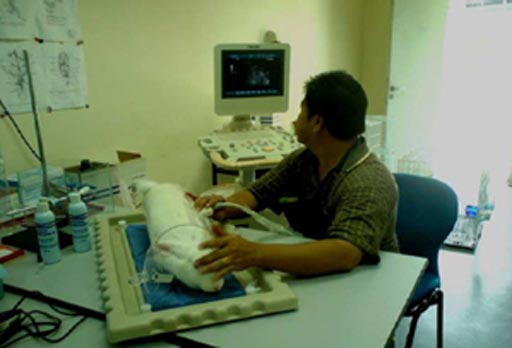Prenatal Ultrasound Can Decrease Bone Density
By MedImaging International staff writers
Posted on 14 Apr 2017
A new study suggests that prolonged prenatal ultrasound exposure leads to decreased bone density and strength.Posted on 14 Apr 2017
Researchers at Universiti Teknologi MARA conducted a study in 22 pregnant New Zealand white rabbits (Oryctolagus cuniculus) to study potential damage and side effects to the developing fetus of ultrasound exposure during osteogenesis. Four rabbits received no ultrasounds, while the others were exposed to ultrasound for 30 minutes, 60 minutes, or 90 minutes once during pregnancy. Each rabbit received only one ultrasound, but timing was varied throughout the three trimesters of pregnancy to see if there were different effects.

Image: Dr. Dom performing an ultrasound on a pregnant doe (Photo courtesy of Sulaiman Md Dom).
They rabbit does gave birth to 142 young, and the researchers analyzed the bunnies' femurs at one and five months for bone strength. The results revealed that trabecular thickness of the experimental group was reduced significantly as compared to the control group. Porosity, tissue mineral density, and empty lacunae were also higher in the experimental group. The study was published in the January 2017 issue of Pertanika Journal of Science & Technology.
“Prolonged exposure to ultrasound during early intrauterine life can cause disturbance in osteogenesis. The effects last until after birth leading to poor bone strength and increasing bone fragility,” concluded study co-author Sulaiman Md Dom, PhD, and colleagues of the department of medical imaging. “The damage in the subjects’ bone was at a faster rate than can be repaired by normal bone remodeling. As a result, bone becomes more fragile and loses its mass.”
A rise in temperature of fetal tissue can cause significant damage to a developing fetus’s central nervous system (CNS) and can result in neurological birth defects. In fact, a recent study suggests that exposure to ultrasound early in gestation could increase autism spectrum disorder (ASD) severity. Osteogenesis is also very sensitive to heat exposure, and a temperature rise can lead to denaturation of the enzymatic and membrane proteins, microcirculation blockage, bone tissue necrosis, and activation of bone marrow macrophages.














